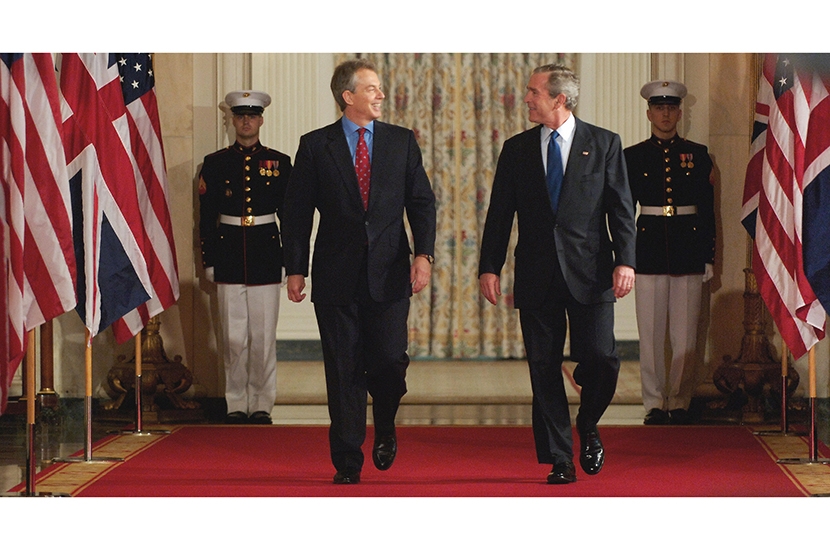The Americans may have pulled out, but luckily the Afghans have the world’s vibrant community of witches intervening to save them. A website for these practitioners of the black arts has devoted its entire attention to the Taliban. One witch commented: ‘It seems like the Taliban gets most of their power from Allah. If we hex Allah it should affect all of the Taliban. Can we hex Allah?’ Another witch, under the user name ‘i-follow-tiny-people’, reports she has made a voodoo doll of the Taliban leader and asks: ‘Any witches want to help me with curses?’ The new Afghan rulers’ days are surely numbered.
Whatever magick the witches conjure up, it cannot possibly be less productive than an intervention by Tony Blair. The former British prime minister described the US withdrawal as ‘tragic, dangerous, unnecessary’: strong words indeed, devalued only a little by the fact that for many people, myself included, he is a war criminal. It takes remarkable front for Blair to open his mouth on the issue at all, seeing as he was one of the principal reasons we now have this humiliating mess on our hands.
It was Blair’s messianic neoliberal evangelism, a mixture of arrogance, naivety and pig ignorance, which underpinned his disastrous foreign policy. That, and a remarkable sycophancy towards the US, regardless of who was running it at the time. Blair’s view of the world was that of a simpleton, yet it persists among neoliberals to this day — not least William Hague, who cannot open his mouth without demanding that we intervene somewhere we have no right or cause to intervene. In short, the neoliberal view was that the end of history really had arrived and that all the peoples of the world desired pretty much the same thing: a nice secular democracy with gender equality, decent drains and everyone living in peace.
It is still not evident to this clown that that is not remotely the case. Blair-led ‘interventions’ (for which, in the case of Iraq, read ‘illegal invasions’) have cost the lives of hundreds of thousands of people in Iraq and Afghanistan (mainly civilians), as well as of more than 600 members of the British armed forces. They have also left behind utter chaos — in Iraq a civil war resulted in the ascendancy of the Islamic State, an administration rather more murderous in its intent than the one presided over by Saddam Hussein.
In order to secure the right to embark on the adventure in Iraq, Blair and Alastair Campbell suborned the security services, twisted their evidence, and repeatedly misled parliament, their own party and the British public — we were lied to on a daily basis. The calculation made by Blair was absurd: remove Saddam and with our ‘help’ Iraqis will embrace democracy and freedom because that is, after all, what everybody wants. It ignored the ethnic and religious complexities of Iraq. It ignored the patently obvious fact that aspirations differ somewhat wildly across this world of ours. Blair’s approach was not merely neoliberal, but also neocolonialist: an attempt to induce developing countries, at the point of a gun, to adopt the agenda of a secular liberal western democracy. Hell, at least the original colonialists were possessed of a certain realism.
You might have expected Blair to be jolted out of this fantasy in 2006. Back then he was jubilant about the prospects of a Palestinian election, believing that the Palestinian crisis would be as straightforward to solve as Northern Ireland had been. Imagine his shock, then, when the people voted for the genocidal terrorists of Hamas. In typical fashion, Blair insisted that the Palestinians had made the wrong choice — that being one of the problems with democracy. But even this does not seem to have given him insight into the multiplicity of complexities in the world, or led to an acknowledgment that we in the West do not have hegemony. They do not do as the rest of us would like them to do, in those dusty and arid places.
And so, Afghanistan. Blair has trotted out the usual rot which I’ve heard quite a lot from his similarly challenged neoliberals in the United Nations: actually, we accomplished quite a lot. Girls went to school. Women were allowed out for a bit. Some girls and some women. The truth is that our 20-year occupation of the country and our puppet government did not touch the sides. At the last count, it was still the case that 99 percent of Afghans believe in Sharia law, 85 percent believe in stoning to death for the crime of adultery, and 79 percent believe that apostates should be executed.
Soft power? Hearts and minds? We won neither hearts nor minds — just gave a tiny percentage of middle-class Afghans a decent income working for us and a little bit of freedom. The vast majority of the country remained utterly unmoved. And the power was not terribly soft — more than 240,000 Afghans killed since 2001.
The speed with which the Taliban retook the country is surely an indication that their return was not universally opposed. The foreign correspondents, undoubtedly brave under fire, nonetheless went native — meaning that they swallowed wholesale the US/UK project, believing it to be a good thing — and never dug down to find out what rural Afghanistan thought about the matter.
Meanwhile, in a kind of cosmic joke at the expense of the dead Iraqis, Afghans etc, Tony Blair was appointed a Middle East peace envoy on behalf of those wonderful organizations the European Union and United Nations. His contribution was described by one Palestinian official as ‘useless, useless, useless’.
The invasion of Iraq was Britain’s gravest foreign policy mistake since Suez, and probably before. Our involvement in the occupation of Afghanistan was the second gravest. Both were the fault of a man who seems to lack either shame or insight.
This article was originally published in The Spectator’s UK magazine. Subscribe to the World edition here.

























